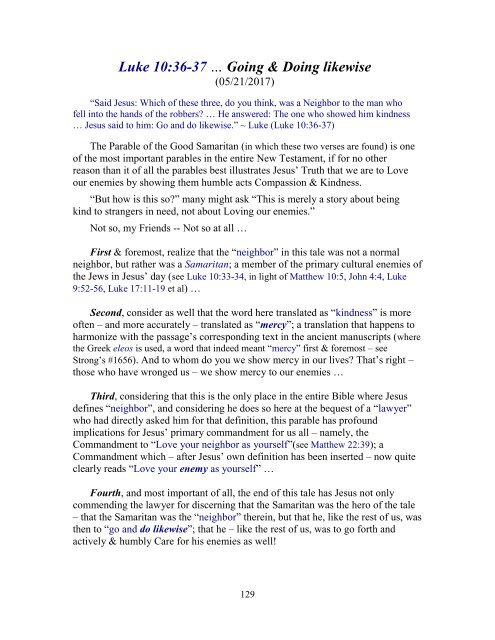My Favorite Verses - Vol V (Feb 17 to Jun 17)
An illustrated collection of brief commentaries on some of the Bible’s most beloved (and some of its least understood) passages, parables, verses & sayings
An illustrated collection of brief commentaries on some of the Bible’s most beloved (and some of its least understood) passages, parables, verses & sayings
You also want an ePaper? Increase the reach of your titles
YUMPU automatically turns print PDFs into web optimized ePapers that Google loves.
Luke 10:36-37 … Going & Doing likewise<br />
(05/21/20<strong>17</strong>)<br />
“Said Jesus: Which of these three, do you think, was a Neighbor <strong>to</strong> the man who<br />
fell in<strong>to</strong> the hands of the robbers? … He answered: The one who showed him kindness<br />
… Jesus said <strong>to</strong> him: Go and do likewise.” ~ Luke (Luke 10:36-37)<br />
The Parable of the Good Samaritan (in which these two verses are found) is one<br />
of the most important parables in the entire New Testament, if for no other<br />
reason than it of all the parables best illustrates Jesus‟ Truth that we are <strong>to</strong> Love<br />
our enemies by showing them humble acts Compassion & Kindness.<br />
“But how is this so?” many might ask “This is merely a s<strong>to</strong>ry about being<br />
kind <strong>to</strong> strangers in need, not about Loving our enemies.”<br />
Not so, my Friends -- Not so at all …<br />
First & foremost, realize that the “neighbor” in this tale was not a normal<br />
neighbor, but rather was a Samaritan; a member of the primary cultural enemies of<br />
the Jews in Jesus‟ day (see Luke 10:33-34, in light of Matthew 10:5, John 4:4, Luke<br />
9:52-56, Luke <strong>17</strong>:11-19 et al) …<br />
Second, consider as well that the word here translated as “kindness” is more<br />
often – and more accurately – translated as “mercy”; a translation that happens <strong>to</strong><br />
harmonize with the passage‟s corresponding text in the ancient manuscripts (where<br />
the Greek eleos is used, a word that indeed meant “mercy” first & foremost – see<br />
Strong‟s #1656). And <strong>to</strong> whom do you we show mercy in our lives? That‟s right –<br />
those who have wronged us – we show mercy <strong>to</strong> our enemies …<br />
Third, considering that this is the only place in the entire Bible where Jesus<br />
defines “neighbor”, and considering he does so here at the bequest of a “lawyer”<br />
who had directly asked him for that definition, this parable has profound<br />
implications for Jesus‟ primary commandment for us all – namely, the<br />
Commandment <strong>to</strong> “Love your neighbor as yourself”(see Matthew 22:39); a<br />
Commandment which – after Jesus‟ own definition has been inserted – now quite<br />
clearly reads “Love your enemy as yourself” …<br />
Fourth, and most important of all, the end of this tale has Jesus not only<br />
commending the lawyer for discerning that the Samaritan was the hero of the tale<br />
– that the Samaritan was the “neighbor” therein, but that he, like the rest of us, was<br />
then <strong>to</strong> “go and do likewise”; that he – like the rest of us, was <strong>to</strong> go forth and<br />
actively & humbly Care for his enemies as well!<br />
129


















